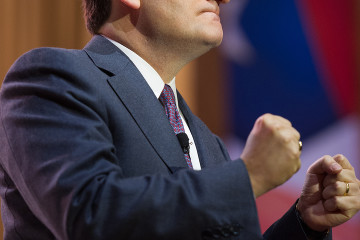The Republican Convention Translated for Liberals: Cass Sunstein

published Jul 22nd 2016, 3:01 pm, by Cass R Sunstein
(Bloomberg View) —
Many Democrats do not merely disagree with the Republican Party platform and with the speakers at this week’s convention. They may even struggle to understand what they are reading and hearing.
That’s a problem for Republican politicians, who hope to connect with Democratic voters, but even more for Democrats, who hope to keep the presidency and to capture the Senate. The reason is that Republicans are appealing to deep and honorable strands in American political culture, which Democrats ignore at their peril.
The best explanation comes from New York University’s Jonathan Haidt, who has produced some of the most illuminating recent work on political psychology. Haidt’s central finding is that across many cultures, human beings have embraced five distinct moral foundations: fairness, avoidance of harm, respect for authority, purity (as opposed to disgust), and loyalty. Contemporary U. S. conservatives embrace all five; liberals emphasize the first two, but care much less about the last three.
Haidt has compiled massive evidence to support these conclusions. Conservatives and liberals agree that it’s wrong to break a promise; that’s unfair. They also concur that it’s wrong to assault someone; that’s harmful. But conservatives feel far more outrage when people have acted disrespectfully toward their superiors, engaged in what they view as a disgusting act or breached a duty of loyalty. Liberals don’t like any of those things either, but to them, avoiding unfairness and harm is much more important.
The 2016 Republican Party platform and convention may well be placing a greater emphasis on authority, purity, and loyalty than at any time since the early 1970s, when Richard Nixon underlined the need to respect authority, making “law and order” a defining Republican theme. (Ronald Reagan once starred in a movie with that title.) Increasingly, Donald Trump is echoing that theme.
He’s deliberately borrowing from Nixon. Paul Manafort, chairman of Trump’s campaign, said the nominee will be using Nixon’s 1968 convention address as the template for his own. Praising Nixon, Trump has drawn attention to the need for authority: “I think what Nixon understood is that when the world is falling apart, people want a strong leader.”
With respect to purity, Republicans are equally clear. The party’s platform describes pornography as “a public health crisis that is destroying the lives of millions.” It says repeatedly that traditional marriage “is the foundation for a free society” and that it is “between one man and one woman.” Evidently targeting the Obama administration’s recent decision to allow transgender soldiers, it rejects “the use of the military as a platform for social experimentation.” It supports English as the nation’s official language.
And loyalty? The platform begins with a dedication, emphasizing loyalty to “the men and women of our military, of our law enforcement, and the first responders.” It insists that our nation “has a sacred trust with our veterans” and that we must “stand by our heroes,” by keeping “commitments to those who signed on the dotted line of enlistment.” Of course Democrats also believe in that sacred trust, but it is no accident that it occupies pride of place in the Republican platform — and that it has become central to the Trump campaign.
Haidt has drawn attention to a sixth moral foundation, which both conservatives and liberals respect, but on whose meaning they sharply disagree: liberty. Conservatives emphasize the right to be let alone. As Ronald Reagan famously said, “The nine most terrifying words in the English language are: I’m from the government and I’m here to help.” By contrast, liberals stress the rights and freedoms of minority groups, such as African-Americans, who (in their view) are entitled to governmental help.
The right to be let alone is a central part of the Republican platform. An entire chapter is devoted to “A Rebirth of Constitutional Government.” It contends that our constitutional order is “in crisis,” because public officials are trampling on property rights, gun rights, the rights of unborn children, and religious liberty. An underlying problem is the rise of “the bureaucratic state,” which jeopardizes economic liberties.
Liberals are not indifferent to authority, purity, loyalty, and the right to be let alone, but those values are less likely to get their juices flowing. That’s one reason that Democrats mock Republican convention speeches.
Whatever Democrats think of the current Republican Party and its nominee, they should stop mocking. Republicans are drawing on long cultural traditions and deep moral convictions. However flawed, a messenger who does that is likely to present a formidable challenge in November — and beyond.
This column does not necessarily reflect the opinion of the editorial board or Bloomberg LP and its owners.
Corrects year of Nixon’s speech in sixth paragraph, and removes quote from 1972 convention speech, in article published July 20.
To contact the author of this story: Cass R Sunstein at csunstein1@bloomberg.net To contact the editor responsible for this story: Christopher Flavelle at cflavelle@bloomberg.net







No Comment